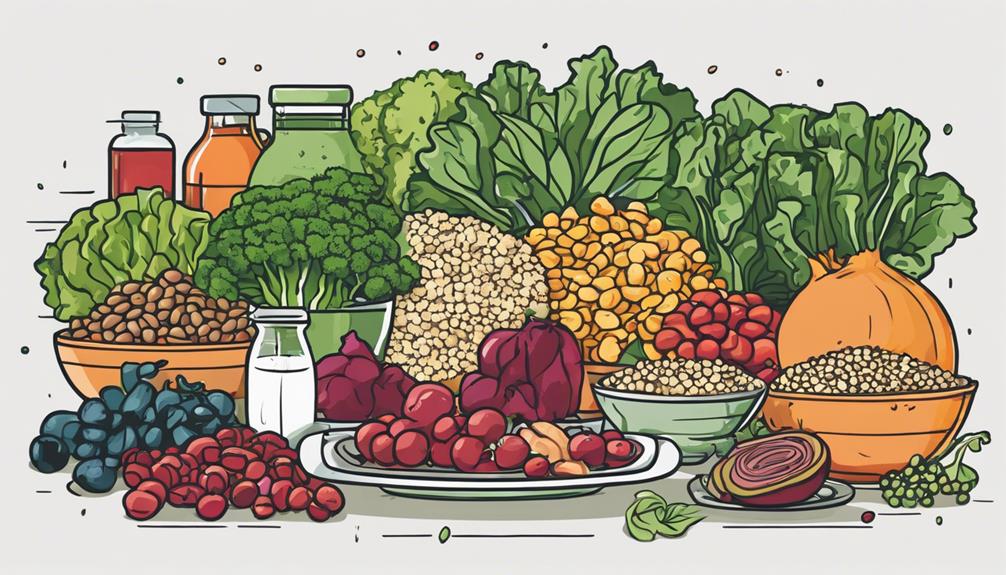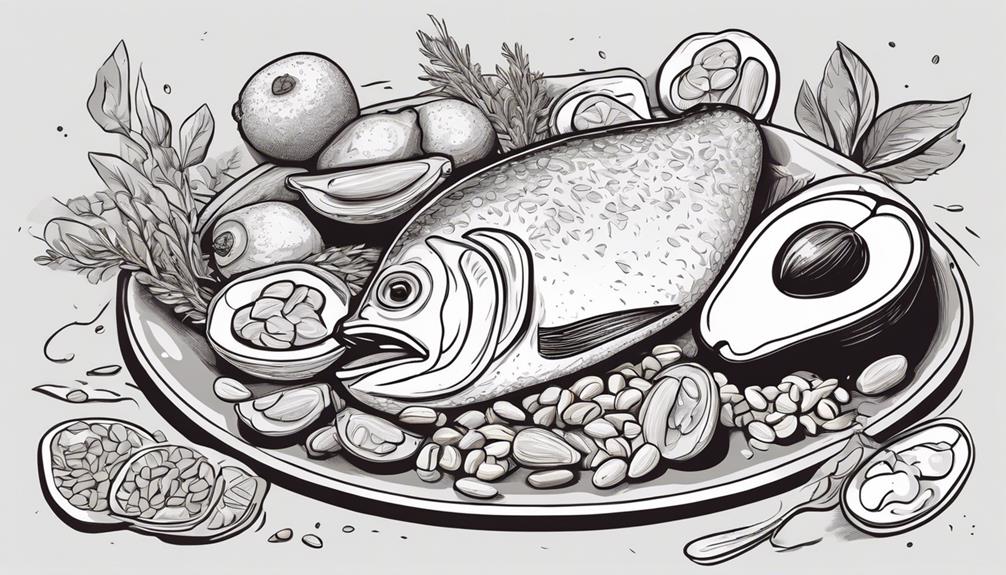Did you know that over 30 million Americans have diabetes, and many of them struggle to manage their blood sugar levels effectively?
By making nine simple dietary adjustments, you can take control of your diabetes and improve your overall health.
From choosing low glycemic index foods to incorporating healthy fats and emphasizing a fiber-rich diet, these strategies can help you on your journey towards effective diabetes management.
But there's more to it than just these few adjustments.
The key lies in understanding how these changes work together to create a balanced and sustainable approach to controlling your diabetes.
Key Takeaways
- Choose low glycemic index foods for stable blood sugar levels.
- Practice portion control and mindful meal planning.
- Include healthy fats like avocados and nuts in moderation.
- Embrace a fiber-rich diet with whole foods for better diabetes management.
Low Glycemic Index Foods

When managing diabetes, incorporating low glycemic index foods into your diet can help stabilize blood sugar levels throughout the day. Low glycemic index foods are essential for controlling blood sugar levels as they're digested more slowly, leading to a gradual rise in blood glucose.
When looking for low carb options, focus on whole foods like non-starchy vegetables, legumes, and whole grains such as quinoa or barley. These foods provide essential nutrients while keeping your blood sugar in check.
Meal planning plays a crucial role in ensuring you have a variety of low glycemic index foods in your diet. When planning your meals, aim for a balance of carbohydrates, proteins, and healthy fats. Try incorporating leafy greens, berries, nuts, and seeds as snacks or meal accompaniments to add more low glycemic index options to your diet.
Remember to consult with your healthcare provider or a dietitian to create a personalized meal plan that suits your specific needs and lifestyle. By incorporating low glycemic index foods and proper meal planning, you can better manage your diabetes and enjoy more stable blood sugar levels throughout the day.
Portion Control Strategies
To effectively manage your diabetes and further optimize your blood sugar levels, implementing portion control strategies is paramount. By moderating your food intake, you can better control your blood glucose levels and improve overall health.
Here are some practical tips to help you with portion control:
- Meal Planning: Plan your meals ahead of time to ensure you're consuming the right amount of food for your body's needs. This can help prevent overeating and promote better blood sugar management.
- Mindful Snacking: Be mindful of your snack choices and portion sizes. Opt for healthy snacks like fruits, nuts, or yogurt, and avoid mindlessly munching on high-calorie, sugary foods. Portion out your snacks in advance to prevent eating more than you intended.
- Use Smaller Plates: Opt for smaller plates and bowls to help control portion sizes. This visual trick can make your portions appear larger, promoting a feeling of fullness while still managing your caloric intake.
Healthy Fats Incorporation

Incorporating healthy fats into your diet is essential for maintaining good overall health and supporting your diabetes management. When it comes to cooking methods, opt for healthier options like baking, grilling, or sautéing with olive oil instead of deep-frying. These methods help retain the nutrients in the food while keeping unhealthy fats at bay.
Additionally, when meal planning, include sources of healthy fats such as avocados, nuts, seeds, and fatty fish like salmon. These foods provide omega-3 fatty acids that are beneficial for heart health and can help improve insulin sensitivity.
Remember that portion control is still important even when consuming healthy fats, as they're calorie-dense. Be mindful of your servings to maintain a healthy weight and blood sugar levels. By making these adjustments to your diet, you can enjoy flavorful meals while effectively managing your diabetes.
Fiber-Rich Diet Emphasis
Emphasize the inclusion of fiber-rich foods in your diet to support better blood sugar control and overall health. Dietary fiber plays a crucial role in managing diabetes by slowing down the absorption of sugar and improving blood glucose levels.
Here are three easy ways to add more fiber to your meals:
- Start your day with a bowl of oatmeal topped with fresh berries for a fiber-packed breakfast.
- Snack on raw vegetables like carrots, cucumbers, and bell peppers with hummus for a satisfying and nutritious crunch.
- Incorporate legumes like lentils, chickpeas, or black beans into soups, salads, or main dishes to increase your fiber intake.
When increasing fiber consumption, it's essential to drink plenty of water to prevent digestive issues. While fiber supplements can be an option, focusing on whole foods is preferable. Additionally, when looking for sweetness, opt for natural sugar substitutes like stevia or monk fruit to control blood sugar levels effectively.
Mindful Eating Practices

Consider practicing mindful eating as a beneficial strategy for managing your diabetes and improving your overall well-being. Mindful snacking habits involve being present and attentive while eating, allowing you to savor your food and recognize feelings of fullness. By focusing on each bite, you can better regulate your blood sugar levels and make healthier food choices throughout the day.
Emotional eating awareness is crucial for individuals with diabetes. Recognizing when you're eating due to emotions rather than hunger can help you develop healthier coping mechanisms. Instead of turning to food for comfort, try engaging in activities like going for a walk, practicing deep breathing, or talking to a friend.
To cultivate mindful eating practices, start by eating without distractions like television or phones. Chew your food slowly and pay attention to the flavors and textures. Additionally, listen to your body's hunger and fullness cues to avoid overeating. By incorporating these habits into your daily routine, you can better manage your diabetes and promote overall wellness.
Frequently Asked Questions
Can Diabetes Be Completely Cured Through Dietary Adjustments Alone?
You can significantly improve diabetes management through dietary adjustments, but a complete cure is unlikely. Alternative treatments and lifestyle changes can aid in long-term results. Patient compliance is crucial for sustainable health outcomes.
How Important Is It to Monitor Blood Sugar Levels Regularly When Following These Dietary Adjustments?
Monitoring blood sugar levels regularly is crucial when following dietary adjustments. Tracking glucose fluctuations allows you to understand how food impacts your levels. This practice empowers you to make informed choices, leading to better diabetes control.
Are There Any Specific Foods That Should Be Completely Avoided by Individuals With Diabetes, Even in Moderation?
When managing diabetes, some foods should be avoided even in moderation. Focus on limiting sugary drinks, processed snacks, high-sugar desserts, and fried foods. Keep portions small and opt for whole, nutrient-dense choices to support better blood sugar control.
Is It Necessary to Consult With a Healthcare Professional Before Making Significant Changes to Your Diet for Diabetes Control?
Before embarking on significant dietary changes for diabetes management, consulting a healthcare professional is crucial. Self experimentation without guidance can pose risks. Personal responsibility and accountability in seeking expert advice ensure safer and more effective outcomes.
How Can Stress Management Techniques Complement Dietary Adjustments in Managing Diabetes Effectively?
When it comes to managing diabetes effectively, stress management techniques like mindfulness can complement dietary adjustments. Incorporating lifestyle changes and exercise routines can enhance your overall well-being and blood sugar control.
Conclusion
So there you have it – nine simple dietary adjustments to help you effectively control your diabetes.
Who knew that managing your condition could be as easy as enjoying some delicious low glycemic index foods and practicing portion control?
With these practical tips, you can take control of your health and enjoy a balanced and satisfying diet.
Who said eating healthy had to be boring?